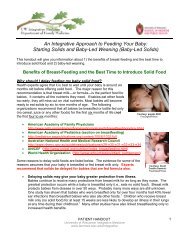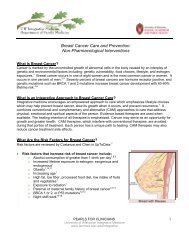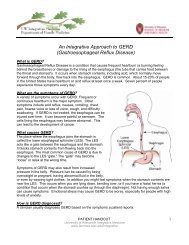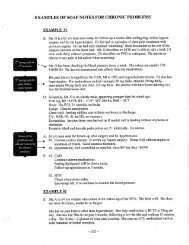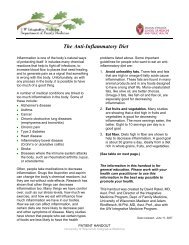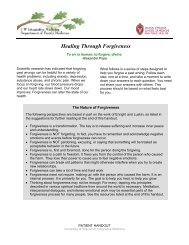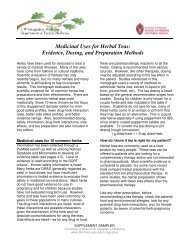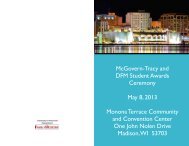Mental Notes Magazine - UW Family Medicine - University of ...
Mental Notes Magazine - UW Family Medicine - University of ...
Mental Notes Magazine - UW Family Medicine - University of ...
You also want an ePaper? Increase the reach of your titles
YUMPU automatically turns print PDFs into web optimized ePapers that Google loves.
Attempting to suppress bad dreams in order to fend <strong>of</strong>f negative<br />
emotions would not be always to our advantage<br />
weekly) experience intensely disturbing dreams that<br />
involve fear, anger, anxiety, disgust, sadness, etc., which end<br />
in abrupt awakenings. Simor et al. (2012) hypothesized<br />
that the impaired functioning <strong>of</strong> the amygdala-mPFC<br />
network during REM sleep would be reflected during<br />
wakefulness through a lower performance on certain<br />
neuropsychological tasks. Subjects suffering from ND did<br />
in fact show greater difficulty carrying tasks requiring the<br />
control <strong>of</strong> emotional reactions, and exhibited a higher<br />
level <strong>of</strong> anxiety. We can then assume that the impaired<br />
communication between the activated structures <strong>of</strong><br />
REM sleep inhibits the proper restoration <strong>of</strong> emotional<br />
balance.<br />
As Dominic Cobb uses the dream to implant an idea<br />
in the 2010 film Inception, could we use our dreams<br />
for “emotional inception” or do our waking emotions<br />
have a stronger impact on our dreams than we can<br />
control Since waking emotions influence dream<br />
content and dreams influence waking emotions, when<br />
and how can we really use dreaming to our advantage<br />
One therapeutic strategy, “imagery rehearsal therapy,”<br />
uses dream imagery repetition during wakefulness to<br />
attenuate the influence <strong>of</strong> negative emotions in dreams<br />
and reduce nightmares. Lucid dreams are those in which<br />
the dreamer is aware <strong>of</strong> dreaming, and to a certain<br />
extent is able to modify dream content. The dreamer<br />
must start <strong>of</strong>f in a state <strong>of</strong> mental relaxation, then move<br />
through a hypnagogic state<br />
and create a dream scene,<br />
which he finally enters. Since<br />
lucid dreaming incorporates<br />
dissociated features <strong>of</strong> both<br />
REM sleep and wakefulness,<br />
can the lucid dream have the<br />
same effect on emotional<br />
regulation<br />
Dreams and the negative<br />
emotions they <strong>of</strong>ten evoke<br />
seem essential to maintain<br />
psychological well-being in<br />
healthy individuals. If dreaming<br />
is a necessary emotional<br />
catharsis, perhaps attempting<br />
to suppress bad dreams in<br />
order to fend <strong>of</strong>f negative<br />
emotions would not be always<br />
to our advantage. More studies<br />
are needed to investigate the<br />
influence <strong>of</strong> dreams on emotions and to understand the<br />
impact <strong>of</strong> dream induction, deprivation and manipulation<br />
on emotion regulation.<br />
References<br />
Desseilles M., Dang-Vu T.T., Sterpenich V., Schwartz<br />
S. (2011a). Cognitive and emotional processes during<br />
dreaming: A neuroimaging view. Consciousness and<br />
Cognition, 20, 998-1008.<br />
Desseilles M., Mikolajczak G., Schwartz S. (2012).<br />
Sommeil, rêves et régulation des émotions. In Mikolajczak<br />
M. &Desseilles M. Traité de la régulation des émotions,<br />
Bruxelles, de Boeck. pp. 87-100.<br />
Desseilles M., Sterpenich V., Dang-Vu T.T., Schwartz S.<br />
(2011b). REM sleep and emotion regulation. In Mallick,<br />
B. N., Pandi-Perumal, S. R., McCarley, R. W., Morrison, A.<br />
R., Rapid Eye Movement Sleep: Regulation and Function,<br />
Cambridge, Cambridge <strong>University</strong> Press, 427-436.<br />
Simor, P., Pajkossy P., Horváth K., Bódizs R. (2012).<br />
Impaired executive functions in subjects with frequent<br />
nightmares as reflected by performance in different<br />
neuropsychological tasks. Brain and Cognition, 78, 274-<br />
283.<br />
Van der Helm E., Yao J., Dutt, S., Rao, V., Saletin, J. M.,<br />
Walker, M. P. (2011). REM sleep depotentiates amygdala<br />
activity to previous emotional experiences. Current<br />
Biology, 21(23), 2029-2032.<br />
Summer 2012 / <strong>Mental</strong> <strong>Notes</strong> / 19



